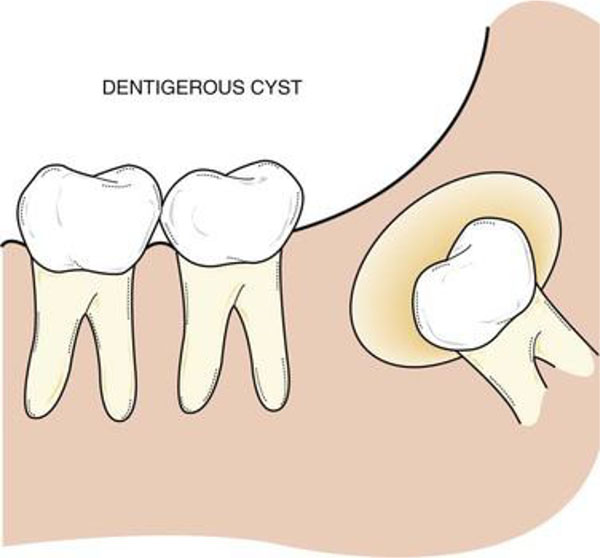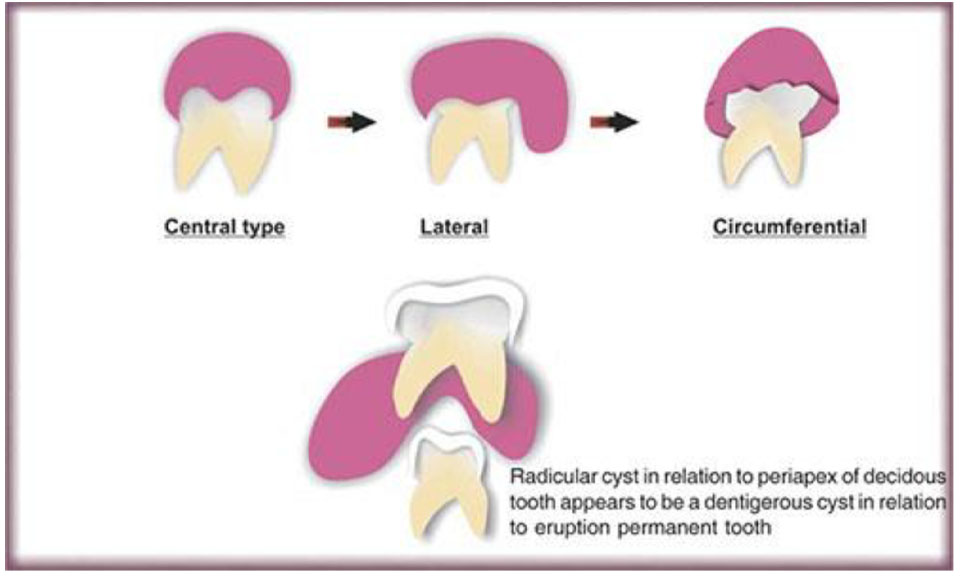- NEED HELP? CALL US NOW
- +919995411505
- [email protected]

DEFINITION
An epithelial cyst containing fluid and one or more imperfect teeth usually thought to result from defect in the enamel forming structure. OR, An odontogenic cyst that surround the crown of the imfacted tooth, caused by fluid accumulation between the reduce enamel epithelium and the enamel surface, resulting in a cyst in which the crown is located within the lumen
- A dentigerous cyst is a fluid-filled sac that forms around the crown of an unerupted tooth. It is the most common type of developmental odontogenic cyst and is usually found in young people.
- A dentigerous cyst is one that results because of the enlargement of the follicular space of the whole or part of the crown of an impacted or unerupted tooth and is attached to the neck of the tooth.
- A dentigerous cyst encloses the crown of an unerupted tooth by expansion of its follicle and is attached to the neck of the tooth.
- It is caused by alteration of reduced enamel epithelium after the completion of amelogenesis which results in fluid accumulation between epithelium and tooth crown.

CAUSES
Dentigerous cysts are usually caused by the accumulation of fluid between the crown of an unerupted tooth and the surrounding dental follicle. They most commonly occur in wisdom teeth, but can also form around other teeth that have not fully erupted. Dentigerous cysts can also be caused by genetic factors or trauma to the jaw.
INCIDENCE
- AGE: first to third decades
- SEX: equal in both sex
- SITE: maxilla -33%,mandible-67%
- Most frequently located in angle of mandible .
- Maxillary 3rd molar area
- Rearly at
- Anterior segment
CYSTIC CONTENTS
- Consist of clear yellowish fluid , in which cholesterol crystals may present
- In case of long standing infection purulent plus may present
CAUSES
Many people with dentigerous cysts do not experience any symptoms, especially if the cyst is small. However, some common symptoms include:
- Swelling in the affected area
- Pain or discomfort
- Redness or inflammation
- Difficulty opening the mouth
- Displacement of neighboring teeth
- Infection
PATHOGENESIS
- Dentigerous cyst arise as a result of cystic change in the remnants of the enamel organ after enamel formation is complete .
- They enclose the crown of an unerupted tooth and are attached to the cementoenamel junction . They develop by expansion of the follicle when fluid collects or space is created between the reduced enamel epithelium surrounds a developing tooth and degenerates as a tooth is erupting
- In the formation of as dentigerous cyst , fluid accumulation occurs when the erupting tooth compresses the tooth follicle and obstructs venous outflow which induces serum to cross through capillary walls
DIAGNOSIS
Dentigerous cysts are often diagnosed through a routine dental examination, although a biopsy may be required to confirm the diagnosis. X-rays, CT scans, and MRI scans may also be used to determine the size and location of the cyst.

RADIOLOGICAL FEATURE
1. Well defied radiolucent area
2. Unilocular or mnultilocular radiolucency encircle the crown of unerupted tooth
3. Radiologically, the dental follicule may expand around the impacted tooth in three variation
- Circumferential
- Lateral
- Coronal or central

HISTOLOGICAL FEATURE
- The cystic lining composed of reduced enamel epithelium
- This epithelium may occasionally keratinize by metaplasia .
- Chronic inflammatoryt cells may found in case of secondary inflammation

TREATMENT:
The treatment for a dentigerous cyst usually involves removing the cyst and the affected tooth. This can be done through a simple surgical procedure. If the cyst is small and not causing any symptoms, it may not need to be removed. However, regular monitoring is important to ensure that the cyst does not grow and cause complications.
COMPLICATIONS
If left untreated, a dentigerous cyst can cause serious complications such as infection, bone loss, and damage to surrounding teeth. In some cases, the cyst can also develop into a more serious type of cyst or tumor. This is why it is important to seek treatment as soon as possible if you suspect that you have a dentigerous cyst.
PREVENTION
Preventing dentigerous cysts is not always possible, as they can be caused by genetic factors. However, maintaining good oral hygiene and attending regular dental check-ups can help to detect cysts early on and prevent complications.
In conclusion, dentigerous cysts are a common type of developmental odontogenic cyst that can cause serious complications if left untreated. If you suspect that you have a dentigerous cyst, it is important to seek treatment from a dental professional as soon as possible. With prompt diagnosis and treatment, most people can expect a full recovery with no long-term complications.




